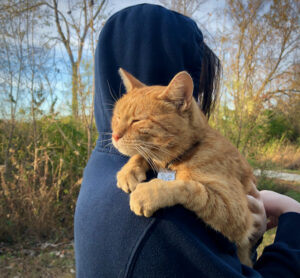
Newt, a study in independence. Photo by John Griswold
Newt is an orange tabby that hangs out on the extensive bike trails in St. Louis’ Metro East. Chances are, if you are walking, running, or cycling in Newt’s territory and see a group stopped ahead, they are petting and making a fuss over him. If the humans are newbs they might be wondering aloud if Newt is a stray, but he has a home; it says so on a tag on his collar, which also says his name and that he likes more than anything to hang out on the bike trail.
I was a newb once, and the first time I saw him splayed on the asphalt path I feared the worst, but he just likes the warmth of the pavement in the sun. Over time I have built a relationship, of sorts, with him and am convinced he knows my breathing when I run. If he is in the mood he begins to trot up the path toward me when he hears me coming, or sometimes springs from the bushes like a tiger to surprise me as a joke. He sits at my feet, arches his back, and puts his front paws on my leg—the claws just barely tipping into my flesh—as an invitation to pick him up and hold him to my shoulder. In winter he likes to warm his paws this way.
Newt is open and accepting and always glad to see passersby, but it is clear he does exactly what he wants, when he wants, including ignoring someone if it means losing concentration on a bug in the weeds. He clearly has favorite visitors—me and my son, I like to believe, among them—and is so affectionate that he does not really understand the dismount, so you have to turn him right-side-up and set him down purposefully, otherwise he botches the landing. He seems puzzled why you would be so silly as to set him down.
Over the last couple of years he has aged some. In the cold, especially, he has started to get that wizened expression of tomcats. But he is fixed, well-fed, and apparently in good medical shape, without even the ripped ears of many outdoors cats.
The bike path is not particularly close to the road at most points, and his human house is in the subdivision on the safe side of the path, away from the road. Still, my son and I have talked about the possibility he might get hit, or that something else might happen. We have agreed, perhaps pre-emptively, that if something does happen to Newt, he has lived an excellent life, of loving attention, vocational roaming, bird-watching, and lazing around twitching his tail. Most humans should be so lucky.
All of which is to say that Newt is free, truly free, like some character in Twain, in a country that obsesses over the word freedom but argues about what it means.
Here’s to all the Newts in our lives—we have all known one or more, I hope, feline, human, or other—who act as models for the free and fulfilled life. And Happy Fourth to our independent and free country, which back in the day did not care a whisker for being the subject of any old bulldog.
